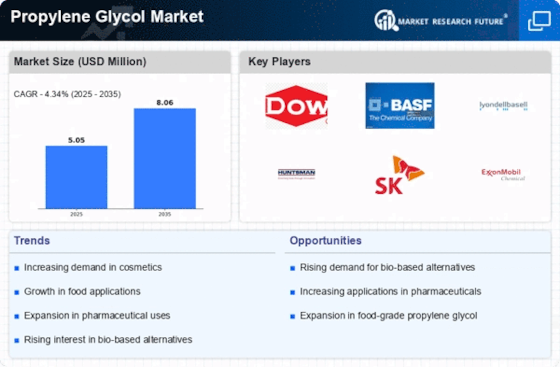Top Industry Leaders in the Propylene Glycol Market

Propylene Glycol Market
The propylene glycol market might conjure up images of frosty car radiators, but its applications stretch far beyond winter preparedness. This versatile chemical plays a starring role in pharmaceuticals, cosmetics, foodstuffs, and a myriad of industrial processes, making it a crucial cog in the global machinery. However, beneath the seemingly innocuous surface of this market lies a fierce competition, where established giants and nimble newcomers vie for dominance with diverse strategies and evolving trends. Let's delve into the factors shaping market share, industry news, and recent developments that paint this dynamic landscape in vivid colors.
Key Players and Adopted Strategies:
-
Dow Chemical (USA): This diversified chemical giant leverages its global reach, extensive production capacity, and brand recognition to secure a significant market share. Their focus on high-purity propylene glycol and technical support attracts premium customers in demanding industries. -
BASF (Germany): Another chemical powerhouse, BASF capitalizes on its economies of scale and cost-effective production processes to offer competitive pricing. They cater to price-sensitive markets with bulk production and strategic partnerships with regional distributors. -
LyondellBasell (USA): A leading producer of propylene glycol from renewable feedstocks, LyondellBasell emphasizes sustainability and eco-friendly solutions. Their focus on bio-based propylene glycol resonates with environmentally conscious consumers and regulatory bodies. -
Shell (Netherlands): This multinational energy giant integrates its upstream oil & gas operations with downstream propylene glycol production, ensuring a secure and reliable supply chain. Their focus on vertical integration and operational efficiency strengthens their market position. -
INVISTA (USA): This diversified manufacturer focuses on niche applications like textile lubricants and antifreeze formulations. Their expertise in tailor-made propylene glycol grades caters to specific industry needs and builds customer loyalty.
Factors Shaping Market Share:
-
Regional Demand: Expanding into high-growth regions like Asia and Latin America unlocks new customer segments and market potential. -
Cost Optimization: Efficient manufacturing processes, optimizing raw material usage, and offering competitive pricing are crucial for profitability in a price-sensitive market. -
Product Innovation: Developing new propylene glycol derivatives with enhanced properties like biodegradability, low toxicity, and improved functionalities provides a competitive edge. -
Sustainability: The rising demand for eco-friendly solutions pushes manufacturers towards bio-based propylene glycol and responsible production practices. -
Downstream Applications: Growth in key industries like pharmaceuticals, cosmetics, and food & beverage drives the demand for propylene glycol.
Key Companies in the Propylene Glycol market include
-
LyondellBasell Industries Holdings B.V. (Netherlands)
-
BASF SE (Germany)
-
Archer Daniels Midland Company (US)
-
Bio-chem Technology Group Company Limited (China)
-
ADEKA CORPORATION (Japan)
-
Chaoyang Chemicals, Inc. (US)
-
Huntsman International LLC. (US)
-
DowDuPont Inc. (US)
-
Manali Petrochemicals Limited (India)
-
HaiKe Chemical Group (China)
Recent Developments:
In August 2021, BASF-YPC Co., Ltd. (BASF-YPC), a 50/50 joint company between both businesses in Nanjing, China, manages the Verbund facility that BASF and SINOPEC have further extended. To support the growing Chinese market as well as increase the capacities of other downstream chemical plants, another new plant for TBA is under construction.
Similarly, in October 2020, Dow and Evonik announced their exclusive partnership for this project. The two of them will team up to develop a new process to produce propylene glycol (PG) directly from propylene and hydrogen peroxide aiming to bring commercial maturity to the propylene glycol market.
Dow Polyurethanes is perched to fulfill these requirements by using advanced recycling technologies. By incorporating innovative methodologies, two distinctive, sustainable PG products have been established in North America, both sanctioned by ISCC PLUS:
• Propylene Glycol REN, with Ecolibrium™ bio-circular technology, provides a path to lowering dependence on fossil fuel-based feedstocks, thus contributing to a more sustainable future.
• Propylene Glycol CIR, with Renuva™ recycled content, caters as a beacon of sustainability by enabling the processing of hard-to-recycle post-consumer and post-industrial waste into viable, sustainable feedstocks.
These latest solutions, REN and CIR, have been thoroughly designed to help customers attain their circularity and sustainability objectives. With flexibility covering diverse industries, including cosmetics, food ingredients, fragrances, personal care, pharmaceuticals, flavorings, agriculture, and industrial applications, these solutions promise to drive sustainability across various sectors.

